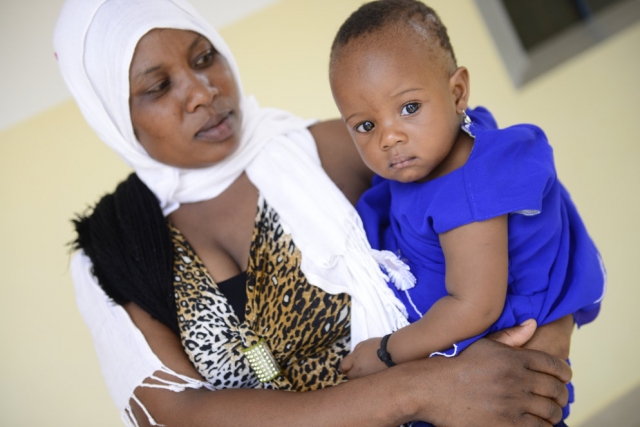African Vaccination Week: highlighting the benefits of immunization
 Brazzaville, Congo, 21 April 2014 -- African Vaccination Week 2014 will see an unprecedented effort to vaccinate millions of African children and adults of all ages against deadly and debilitating diseases. The vaccination activities, led by all national governments of the continent, with support from the World Health Organization, (WHO), UNICEF and partners, kicks off 22 April, 2014.
Brazzaville, Congo, 21 April 2014 -- African Vaccination Week 2014 will see an unprecedented effort to vaccinate millions of African children and adults of all ages against deadly and debilitating diseases. The vaccination activities, led by all national governments of the continent, with support from the World Health Organization, (WHO), UNICEF and partners, kicks off 22 April, 2014.
Vaccination - a shared responsibility is the theme of this year’s AVW, highlighting the important role governments, health care workers, parents, families and communities can all play in saving lives through immunization.
“Vaccines are today’s proven protection tools, particularly against vaccine-preventable diseases. Vaccines save lives, prevent disability, and lead to the emergence of healthier communities everywhere,” says WHO Regional Director for Africa, Dr Luis Sambo. “As we celebrate African Vaccination Week 2014, we should all discharge the double responsibility of getting ourselves vaccinated and ensuring that our families and community members are up-to-date with recommended vaccination schedules.”
All countries on the African continent are expected to be part of this year’s AVW, joining the rest of the world in commemorating the World Immunization Week, which is held every year during the last week of April.
“While we celebrate the hard-won gains achieved through immunization, let’s not forget that millions of African children are still dying, simply because cost-effective interventions, such as immunization, were not made available to them,” said Leila Pakkala, UNICEF Regional Director for Eastern and Southern Africa. “In the Horn of Africa, for example, there are close to 1 million children who have never been immunized or have been partially immunized. The recent polio outbreak in that region is just one such reminder that children everywhere will not be safe unless all of them, especially those living in the most hard-to-reach areas are reached and protected. “The African Vaccination Week is an opportunity to strengthen routine immunization, and it is also an opportunity for us to reach those children who have never been reached before,” added Ms. Pakkala.
Across the continent, immunization drives will take place from health centres to bus terminals and from border check points to market places. Children and adults will be protected against a wide range of diseases, including diphtheria, tetanus, whooping cough, polio, hepatitis B, pneumonia, measles, and yellow fever. At the same time, health workers will administer Vitamin A supplementation, deworming medicines, and long-lasting insecticide-treated mosquito nets to protect against malaria.
Outreach vaccination teams have been mobilized to visit communities with limited access to health services, such as those living in remote areas, urban fringes and internally displaced people. They will bring with them the messages on the benefits of immunization, and encourage parents and caretakers to ensure their children receive full doses of vaccines. Other activities - exhibitions, trainings, debates, and media and social mobilization campaigns – will also be held to further galvanize public awareness and support.
On 24 April, WHO, UNICEF and partners will officially launch AVW in Brazzaville, capital of Congo. During the week, the country will formally introduce rotavirus vaccine into the country’s routine immunization programmes. Rotavirus is the main cause of severe diarrhoea among young children worldwide, and it kills more than 700 Congolese children under five years of age each year.
In Angola and Lesotho, rotavirus vaccine will also be formally introduced during AVW, in addition to pneumococcal vaccine that protects children from pneumonia.
++++++++++++++++++++
About WHO
WHO is the directing and coordinating authority on international health within the United Nations system. As of January 2013, WHO had 194 Member States. WHO is responsible for providing leadership on global health matters, shaping the health research agenda, setting norms and standards, articulating evidence- based policy options, providing technical support to countries and monitoring and assessing health trends. For more information, please visit: www.who.int
About UNICEF
UNICEF promotes the rights and wellbeing of every child, in everything we do. Together with our partners, we work in 190 countries and territories to translate that commitment into practical action, focusing special effort on reaching the most vulnerable and excluded children, to the benefit of all children, everywhere. For more information, please visit: www.unicef.org
Media Contacts
Samuel T. Ajibola, WHO Regional Office for Africa, Brazzaville, tel: +47 24139378, mobile: +242 066537022, email: ajibolas [at] afro.who.int
Kun Li, UNICEF Eastern and Southern Africa Regional Office, tel: +254 734813983, email: kli [at] unicef.org



